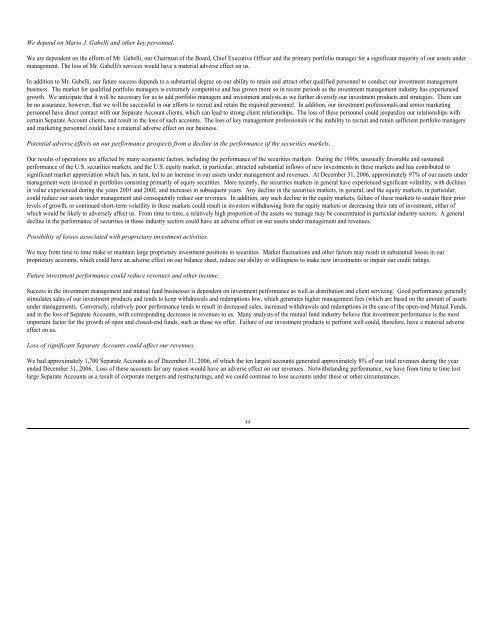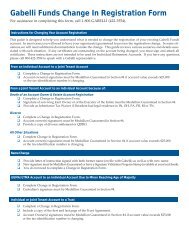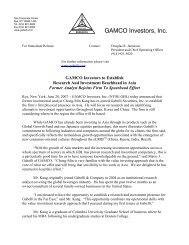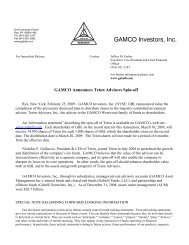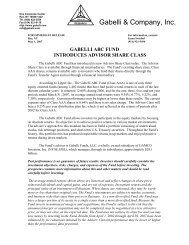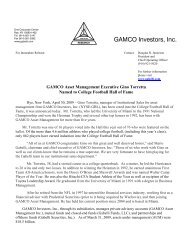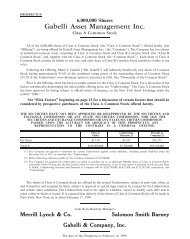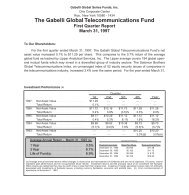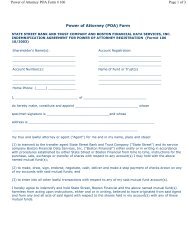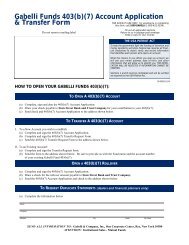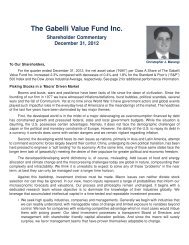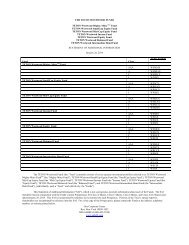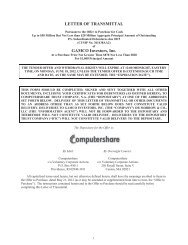FORM 10-K/A GAMCO Investors, Inc. - Gabelli
FORM 10-K/A GAMCO Investors, Inc. - Gabelli
FORM 10-K/A GAMCO Investors, Inc. - Gabelli
- No tags were found...
You also want an ePaper? Increase the reach of your titles
YUMPU automatically turns print PDFs into web optimized ePapers that Google loves.
We depend on Mario J. <strong>Gabelli</strong> and other key personnel.<br />
We are dependent on the efforts of Mr. <strong>Gabelli</strong>, our Chairman of the Board, Chief Executive Officer and the primary portfolio manager for a significant majority of our assets under<br />
management. The loss of Mr. <strong>Gabelli</strong>'s services would have a material adverse effect on us.<br />
In addition to Mr. <strong>Gabelli</strong>, our future success depends to a substantial degree on our ability to retain and attract other qualified personnel to conduct our investment management<br />
business. The market for qualified portfolio managers is extremely competitive and has grown more so in recent periods as the investment management industry has experienced<br />
growth. We anticipate that it will be necessary for us to add portfolio managers and investment analysts as we further diversify our investment products and strategies. There can<br />
be no assurance, however, that we will be successful in our efforts to recruit and retain the required personnel. In addition, our investment professionals and senior marketing<br />
personnel have direct contact with our Separate Account clients, which can lead to strong client relationships. The loss of these personnel could jeopardize our relationships with<br />
certain Separate Account clients, and result in the loss of such accounts. The loss of key management professionals or the inability to recruit and retain sufficient portfolio managers<br />
and marketing personnel could have a material adverse effect on our business.<br />
Potential adverse effects on our performance prospects from a decline in the performance of the securities markets.<br />
Our results of operations are affected by many economic factors, including the performance of the securities markets. During the 1990s, unusually favorable and sustained<br />
performance of the U.S. securities markets, and the U.S. equity market, in particular, attracted substantial inflows of new investments in these markets and has contributed to<br />
significant market appreciation which has, in turn, led to an increase in our assets under management and revenues. At December 31, 2006, approximately 97% of our assets under<br />
management were invested in portfolios consisting primarily of equity securities. More recently, the securities markets in general have experienced significant volatility, with declines<br />
in value experienced during the years 2001 and 2002, and increases in subsequent years. Any decline in the securities markets, in general, and the equity markets, in particular,<br />
could reduce our assets under management and consequently reduce our revenues. In addition, any such decline in the equity markets, failure of these markets to sustain their prior<br />
levels of growth, or continued short-term volatility in these markets could result in investors withdrawing from the equity markets or decreasing their rate of investment, either of<br />
which would be likely to adversely affect us. From time to time, a relatively high proportion of the assets we manage may be concentrated in particular industry sectors. A general<br />
decline in the performance of securities in those industry sectors could have an adverse effect on our assets under management and revenues.<br />
Possibility of losses associated with proprietary investment activities.<br />
We may from time to time make or maintain large proprietary investment positions in securities. Market fluctuations and other factors may result in substantial losses in our<br />
proprietary accounts, which could have an adverse effect on our balance sheet, reduce our ability or willingness to make new investments or impair our credit ratings.<br />
Future investment performance could reduce revenues and other income.<br />
Success in the investment management and mutual fund businesses is dependent on investment performance as well as distribution and client servicing. Good performance generally<br />
stimulates sales of our investment products and tends to keep withdrawals and redemptions low, which generates higher management fees (which are based on the amount of assets<br />
under management). Conversely, relatively poor performance tends to result in decreased sales, increased withdrawals and redemptions in the case of the open-end Mutual Funds,<br />
and in the loss of Separate Accounts, with corresponding decreases in revenues to us. Many analysts of the mutual fund industry believe that investment performance is the most<br />
important factor for the growth of open and closed-end funds, such as those we offer. Failure of our investment products to perform well could, therefore, have a material adverse<br />
effect on us.<br />
Loss of significant Separate Accounts could affect our revenues.<br />
We had approximately 1,700 Separate Accounts as of December 31, 2006, of which the ten largest accounts generated approximately 8% of our total revenues during the year<br />
ended December 31, 2006. Loss of these accounts for any reason would have an adverse effect on our revenues. Notwithstanding performance, we have from time to time lost<br />
large Separate Accounts as a result of corporate mergers and restructurings, and we could continue to lose accounts under these or other circumstances.<br />
34


